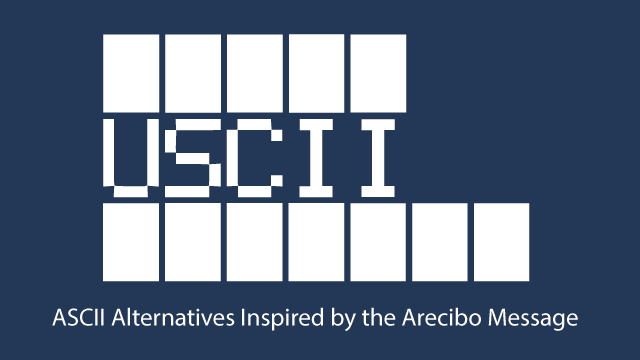Note: Please see http://uscii.hostilefork.com for information about this project, including an explanatory video.
A USCII system ("Universal Semiotic Coding for Information Interchange", pronounced "you-ski") is a method of embedding 2-D visual representations of letters, numbers, and control signals into the coded numbers agreed upon to represent them.
For instance, instead of using 65 for A and 66 for B as ASCII does, we might consider using 15621226033 for A and 16400753439 for B. The reason this could be interesting is that when converted into binary, these are:
15621226033 (base 10) = 01110100011000110001111111000110001 (base 2)
16400753439 (base 10) = 11110100011000111110100011000111110 (base 2)
When transmitted in a medium which hints at the significance of a 35-bit pattern, the semiprime nature of that number hints at factoring it into 5 and 7 to make a rectangle of those dimensions. If we do, then it will reveal the letters they represent as a picture:
01110100011000110001111111000110001:
01110
10001
10001
10001 => "A"
11111
10001
10001
11110100011000111110100011000111110:
11110
10001
10001
11110 => "B"
10001
10001
11110
This script generates a draft of the USCII variation "5x7-ENGLISH-C0". I've informally labeled this standard "Arecibo Ascii" as an homage to SETI's Arecibo Message, which employed a similar strategy:
http://en.wikipedia.org/wiki/Arecibo_message
5x7-ENGLISH-C0 has pictoral representations of all ASCII characters which include the uppercase and lowercase English alphabet, numbers, and some symbols...as well as the "C0 control codes":
http://en.wikipedia.org/wiki/C0_and_C1_control_codes
It is therefore possible to losslessly convert a stream of ASCII characters into USCII-5x7-ENGLISH-C0 and back.
